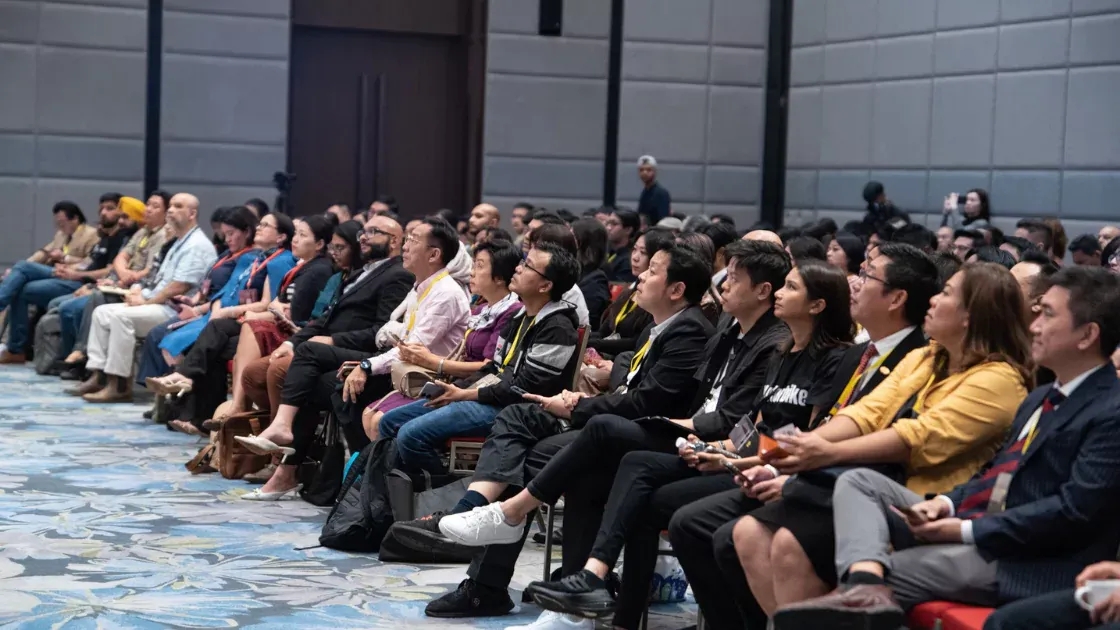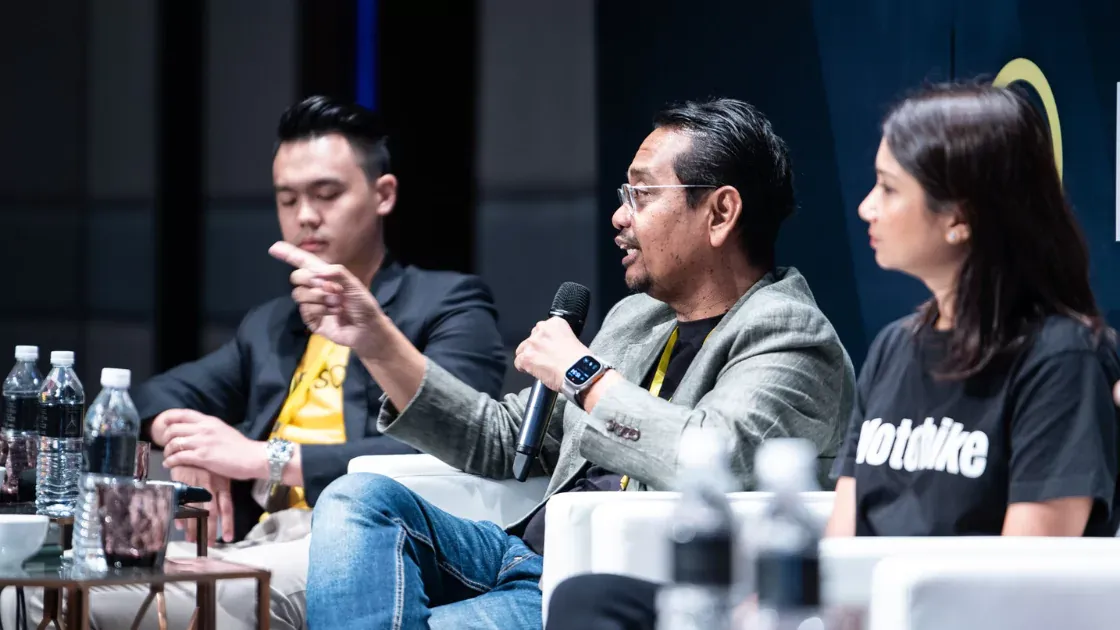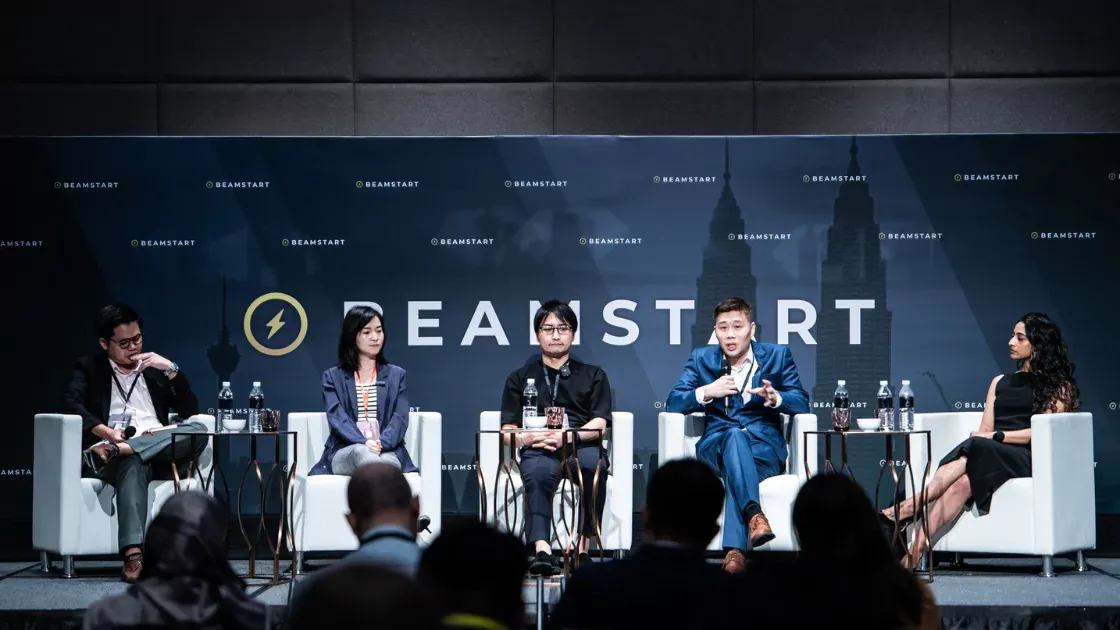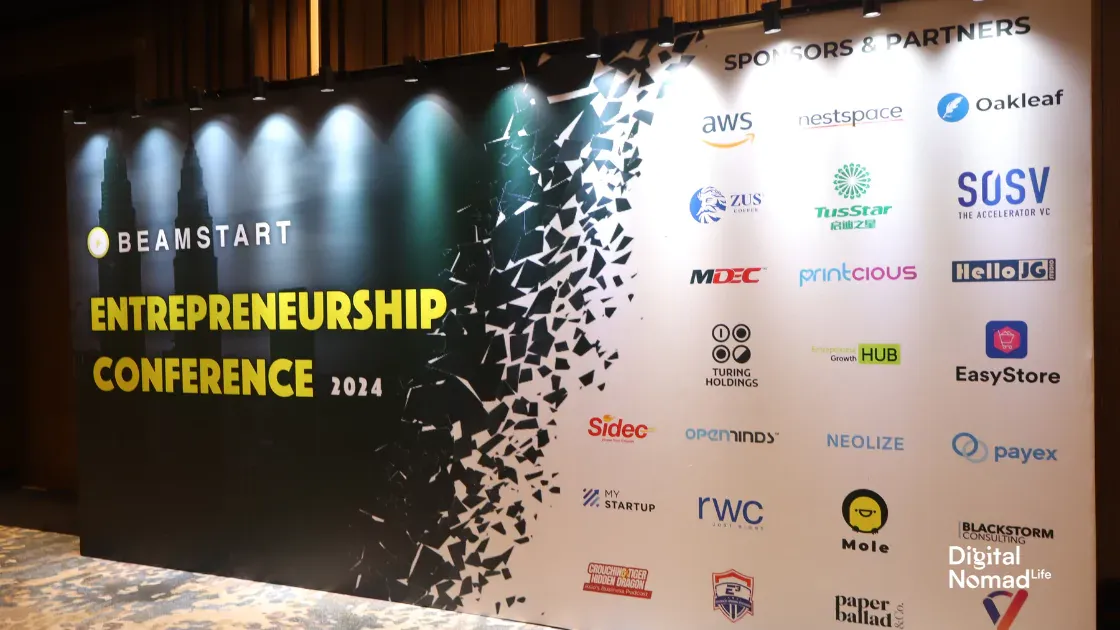Key Takeaways from Malaysia’s Entrepreneurial Ecosystem at BEAMSTART Entrepreneurship Conference 2024
The BEAMSTART Entrepreneurship Conference 2024 was more than just an assembly of Malaysia's brightest minds in business; it was a profound journey through the realms of innovation, strategy, and visionary foresight.

BEAMSTART recently hosted its annual flagship event, “Entrepreneurship Conference 2024” at Avante Hotel. It was a gathering of Policy Makers, Founders, Investors, VC Funds, Startups, Angels, Entrepreneurs, Builders, and PE Funds supporting the entrepreneurial ecosystem in Malaysia.
This in-person event was designed to unite the business community for thoughtful discussions on current global challenges, as well as to unlock potential opportunities within the entrepreneurial ecosystem. This year's theme revolved around The Changing New World and The Impact of Artificial Intelligence.
More than 500 people attended the May 9th “Entrepreneurship Conference 2024” in-person event. Conference segments included:
- Valuable insights from industry leaders (VIP Speakers),
- Investor 1-to-1 Matching,
- Business Support & Assistance sessions,
- Networking Zone,
- Signature After-Party @ SkyBar,
- And much more!
Let’s have a look at the valuable insights shared during this sought after Entrepreneurship Conference to learn more about the business community in Malaysia.
Table of Contents
- Lessons on Starting Up — New beginnings in a rapidly changing world
- Lessons on Scale & Hyper-Growth — Expanding in uncertain times
- Lessons on Venture Investing — Future Trends & The Impact of AI and the Changing World Order
- Lessons on Building a Legacy – IPOs, Exits, and Building an Enduring Company
Lessons on Starting Up — New beginnings in a rapidly changing world
It was an interesting session where speakers took turns in sharing what to expect in the entrepreneurial journey.

Change is inevitable
“Your first 100 employees won’t be there when you’re ringing the bell. Be ready to let go of people and manage finances.” said Yienyee Soh @ EasyStore to emphasise that change is inevitable in the journey as a founder, especially the change in personnel.
Set realistic expectations
“A lot of startups fail because of partnership disputes. As the company grows it can change expectations and perspectives. Try to sort out the expectations like whether it's a full time or part time stint when beginning.” shared Jan Wong @ OpenMinds Resources reminding founders to set clear expectations with their co-founders and partners.
Don’t make things personal and emotional
Zac Liew @ Curlec by Razorpay reminded the audience of the no-linear aspect of the founder 's journey, by sharing that, “One pitfall when you’re beginning is that getting emotional. It’s (founder Journey) never really linear. You always get affected by lows and highs. Reality is that.”
What’s your WHY
Yienyee Soh shared “Figure out the big Why when you’re starting. Remember that the competitors are trying to solve the same problem in different ways. But don’t forget that your why is attached to what you’re doing.”This is an important reminder that the founders need to keep revisiting in their journey. Sometimes we forget our WHY or the Purpose.
Plan it out and do it
“Can’t say just do it because most of us have things to do and people to take care of. So plan it and do it” Casimir Yong @ Paperballad & Co. finally reminds us all that ultimately we most of us have some kind of responsibilities in life and people to take care of, so when starting up your business, don’t forget to plan things out for yourself and those around you won’t be in unnecessary situations.
Lessons on Scale & Hyper-Growth — Expanding in uncertain times
Scaling a business is a massive operation in any kind of business. This panel of speakers shared their insights into scaling and growing in these uncertain times with a special focus on leveraging AI in doing so.

Growing with Local Partners
Kamarul A. @ Aerodyne Group discussed overcoming regulatory challenges when entering 45 countries. He explained that partnering with local entities allows them to handle data according to regional regulations, keeping it within the country. These local partners, who are experts in industries Aerodyne isn't familiar with, facilitate smoother entry and growth. Kamarul A mentioned that “Subsidiaries are experts in industries we are not in. So it’s easier to enter and grow.” highlighting that new business opportunities in new industries can emerge through successful partnerships.
Understand the PMF when entering a market
Aaron Kee @ Carsome said: “Are you solving a supply chain problem? Solution we (Carsome) are offering is applicable to many countries but it’s important to continuously innovate and iterate, and solutions should be designed around the culture of the country,” emphasising the importance of assessing the solution against the market needs before entry, and adapting solutions to fit cultural contexts. This effectively outlines the strategic approach needed for successful market penetration. This focus on continuous innovation and cultural tailoring is crucial for global scalability and relevance.
Making better decisions with AI
Swee Wai Hoow @ Newswav, Malaysia’s #1 content aggregator, reminded all of us that “AI is here as a tool to make humans better in making the right decisions. It can’t escape the fact that AI will be supervised by humans.”
It is a reminder that AI can enhance decision-making processes by giving you data-driven insights. This technology is here to enable companies to optimise operations, predict market trends, and make informed strategic decisions. And this can ultimately support scalable growth.
Leverage AI in after-sales market
Sharmeen Looi @ iMotorbike shared how AI is used in making quick decisions in after-sales market: “We use AI as a tool to help and not replacing a job. That helps the after-sales market. How does it help to scale? It takes a shorter time to fix a problem. Still need the mechanic to fix the bikes, but they take a shorter time to fix.” AI tools can automate service requests, personalize customer interactions, and streamline operations. This can help in rapid scaling of businesses.
Attracting the right talent
Final words on the importance of having the right talent with you when scaling and growing your company were delivered by Kamarul A. where he gave very interesting insights into the hiring practices of Aerodyne Group which hires talent in the global talent market.Tip1: The cost of hiring has gone up over the past few years. Therefore, brand reputation plays a major role in the job market right now. Why would people want to work for you? Become a brand which can attract global talent.
Tip 2: There are at least 10 people who get paid more than Kamarul A even though he is the group CEO. Be transparent and pay the right salaries to the right people. Paying competitive salaries to retain high-quality employees is important in the growth phase of your business.
Lessons on Venture Investing — Future Trends & The Impact of AI and the Changing World Order
Prominent VCs from the South Asia market shared some interesting insights into the South Asian VC landscape.

Malaysia and its future
Christopher Quek @ TRIVE highlighted the robust spirit of Malaysian entrepreneurs, stating, "The tenacity of the Malaysian founders is amazing, and there's a lot of openness in the government and market as a test bed." He believes this creates a fertile ground for impact investments and innovative ventures. Especially with the recent announcement of the KL20 indicates the potential and performance of the Malaysian market in the coming years.
Tanuja Rajah @ M Venture Partners complemented this view with economic insights, "Malaysian founders have stretched the dollar and focused on good unit economics. Now more money is coming into Malaysia which can significantly boost local startups." She pointed out the growing financial support and how it facilitates the scaling of startups within the region.
Tanjua further shared how the Singapore government has engaged in initiatives like the Early Stage Venture Fund (ESVF) scheme, where it partnered with venture capital firms to co-invest in local startups. This approach helped amplify the amount of funding available to startups and encouraged more private investment in the early stages of business development. So the efforts of the Malaysian entrepreneurial ecosystem will be part of broader strategies to boost the startup ecosystem in the region.
Gap between startups and VCs
"42% of startups fail because they don’t meet the market need." Tanuja Rajah from M Venture Partners highlighted a common issue contributing to such startup failures. She emphasised that one significant reason for the mismatch between founders and VCs in early-stage companies is the alignment on exit strategies. By 'exit strategy,' she refers to the planned approach for VCs to divest their holdings typically within a fund's lifespan, which is usually about 10 years. Founders who proactively consider and facilitate these exit strategies align better with the goals of VCs, making them more attractive as investment opportunities.
Adding to the discussion, Koichi Saito from KK Fund addressed potential red flags in venture investment decisions. He noted that founders presenting multiple projects simultaneously can be concerning, as it may indicate a lack of focus. Furthermore, he emphasized the importance of coherence in a founder's narrative. If a founder starts a company significantly different from their previous experiences, they must clearly articulate the connection. A coherent story helps demonstrate alignment with the company's mission and purpose, reducing concerns about misalignment.
Advice for the audience
Yuan Fang @ BAce Capital offered guidance for approaching VCs, emphasizing strategic considerations: "Think about the pain point you are trying to solve. Is your TAM enough? Is this a mass market problem?" She urged founders to consider deeply whether their business addresses a substantial market need. Additionally, she advised maintaining robust relationships with investors, "Keep an open dialogue with VCs. Start having conversations when you don’t need the money." Yuan stressed the importance of communication with potential investors well before the need for funding arises, facilitating easier capital acquisition when needed.
Lessons on Building a Legacy – IPOs, Exits, and Building an Enduring Company
A wholesome conversation with 3 prominent entrepreneurs sharing their insights into what it means to build a company with exits and IPOs in mind.

Building a legacy
Venon Tian @ Zus Coffee, shared insights from his journey with Zus Coffee, which began with learning the retail trade through a laundry business, eventually leading to establishing the largest coffee brand in Malaysia with expansion into the Philippines. "From starting local businesses to taking a Malaysian brand global, the vision has always been about building a sustainable business that supports communities and scales effectively," he explained.
Wong Keh Meng offered his perspective on the meaningful impact of strategic financing for small and medium-sized enterprises (SMEs). He highlighted the role of his company's financing approaches in enabling SMEs to enhance their productivity and scale effectively. "The nature of the financing we provide is designed to empower SMEs to not just survive but thrive by paying salaries, funding marketing efforts, and more. This shows our impact on them," Wong stated. He emphasized the dual goals of his firm: to support businesses in scaling up efficiently and to ensure these businesses can sustain their operations and continue their beneficial roles in the community. This approach to financing reflects a broader vision of building a business legacy that not only grows but also maintains its foundational values and continues to perform good work at scale.
In the discussion on building a legacy, Timothy Tiah @ Colony shared his personal experience with the decision against pursuing an Initial Public Offering (IPO) for his company. He candidly reflected on the intense pressures and the unexpected complexities involved, particularly the challenges of managing a shareholder registry and the ongoing demands it placed on him. "The decision to go public is monumental, and it wasn't right for us at the time. I found myself losing sleep over the shareholder registry and other regulatory concerns, which took my focus away from what I loved about my business," Timothy explained. This insight underlines the importance of aligning such strategic decisions with personal readiness and the overall business mission, emphasizing that an IPO, while beneficial for some, is not a one-size-fits-all solution and should be approached with careful consideration of both its advantages and its significant demands.
Using AI in building business
Venon discussed how Zus Coffee has integrated AI into their operations, emphasizing its role in customer service. "AI isn’t just about automation; it’s about enhancing our capability to handle scale without losing touch with what customers need," he stated.
Wong Kah Meng @ Funding Societieshighlighted the transformative impact of AI in financial services, particularly in automating credit decisions for SMEs and MSMEs, which often lack sufficient data for traditional processing methods.
Exit Plan: What does it mean?
The concept of an exit strategy was a significant theme. Venon expressed that his exit plan is not just about financial gain but about leaving a lasting legacy and continuing to influence positively. "Building a legacy is about creating something enduring, something that outlives your involvement," he remarked.
Timothy shared a more personal reflection, "Having an exit strategy is crucial, but so is the reason for returning. It’s about the freedom to choose what’s next, and ensuring the business continues to thrive beyond personal involvement."

The BEAMSTART Entrepreneurship Conference 2024 was more than just an assembly of Malaysia's brightest minds in business; it was a profound journey through the realms of innovation, strategy, and visionary foresight.
Each session, from starting up to scaling up and making impactful exits, echoed a common theme: the transformative power of understanding and adapting to the intricacies of the entrepreneurial landscape.
As we reflect on the myriad of insights shared by seasoned leaders, it's clear that the road to success is paved with perseverance, adaptability, and a deep understanding of one's market and mission. The conference not only illuminated the path many Malaysian entrepreneurs are poised to take but also showcased the resilient spirit and ambitious drive that define Malaysia's burgeoning business community. This gathering was a testament to the potential that lies within disciplined strategies and innovative thinking, providing a blueprint for others to follow and adapt in their quest for business excellence and legacy building.




Comments ()